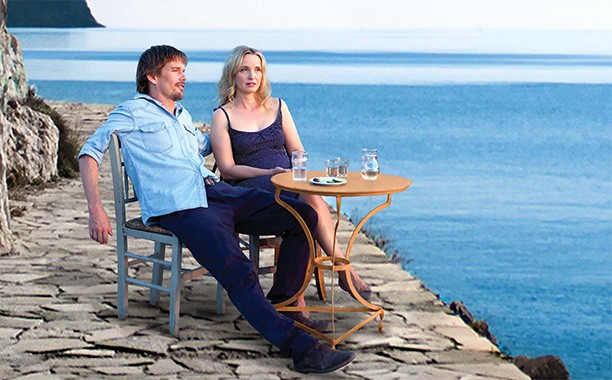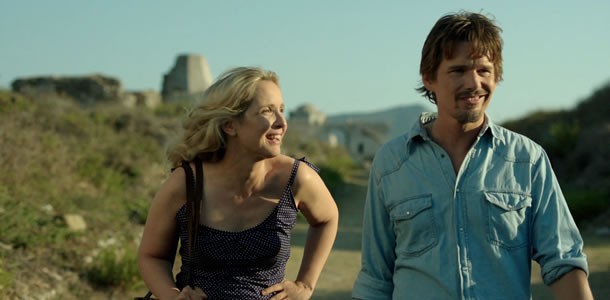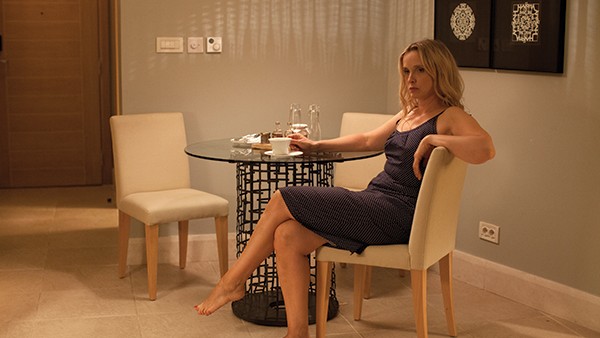Ahoy, squirts! Quint here. I’m one generation removed from the leads in Richard Linklater’s Before series (Sunset, Sunrise and Midnight), but as a hopeless romantic I’ve always been able to identify with Jesse and Celine. What guy doesn’t want to randomly meet a beautiful French girl and begin a decades-long love affair?
As the series has progressed it has shown true love in all its stages, from puppy love/love at first sight to a more grown up deep-rooted, conflicted love to the stage where the sheen has worn off and both partners see each other clearly, for good or ill.
Before Midnight is a very grown up flick, but one that is expertly executed. It’s not as quotable and fun as Dazed and Confused or feel-goody as Before Sunrise, but it is the Richard Linklater movie that has resonated with me the most.
I had the chance to sit down with Rick, who has been an Austin film scene fixture since I was a wee lad attending AFS Sam Fuller retrospective screenings, and discuss the latest step in Jesse and Celine’s adventure through love and life as well as the very un-mumblecore approach to the filmmaking, including the fascinating writing process between himself, Julie Delpy and Ethan Hawke. Enjoy!

Quint: I’ve always liked this series and I especially like what you did with the second film. There’s something about two people who lost each other and find each other again that really cut to the core for me. The new film explores the realities of a long-time relationship and with all the fighting and bickering and jabbing, I oddly found Before Midnight to be the most romantic of the three.
Richard Linklater: That’s awesome.
Quint: There’s just something to the authenticity of two people who love each other after the sheen has worn off…
Richard Linklater: It’s hard earned. We all end up where we deserve to be. If you want to be a romantic, optimistic person in this world it doesn’t come to you. You have to work at it. You have to really go through it in your mind and do the hard work.
There’s some tough stuff in (Before Midnight), but I think that honesty is important at this age, in their 40s. They’re not 23 year old kids. I felt our bedrock of the film was if they’re still talking with each other and are still making each other laugh a little…
Quint: Then that’s a win for them?
Richard Linklater: Yeah, I hate to tell young people, but that’s as good as you’re gonna do! (laughs) That’s pretty good for 40 and above. I know couples where she or he… whatever was great for them, like “He’s the funniest guy in the world!” now the wife is just sitting there and she’s done. He’s not funny anymore. He is what he is. “He’s the dad of my kids, but I don’t laugh the way I used to.”
Quint: I usually don’t like seeing characters I care for go after each other in films like this, but I really like what you did here. The arguments are all very layered. For instance, the hotel room sequence where Celine storms out a few times. She always comes back, but if she hadn’t then that would have probably been it for those two. There is meanness that pops up, but it’s always in a defensive way, which allowed me to stay invested. If they were just being mean for the sake of being mean I would have checked out.
Richard Linklater: You totally get this argument. Arguments… you don’t just go after each others’ throats, especially with someone you’ve (built) a life with. You try different tactics. That’s what he’s doing kind of the whole movie. That’s what a long term thing is, subtle manipulations and then every now and then you have to step up. It’s not a knock down drag out fight.
Quint: Jesse’s trying to get her to be open to moving to Chicago so he can be closer to his son, but the feeling I get is he’s not convinced himself that’s the right thing to do. You put Celine in a similar situation with the job offer she got. That’s what’s so great about what you did here. At the beginning of the movie neither one is for sure wanting to go one way or the other, but when the cards are down they get very defensive.
Richard Linklater: Once it gets to that point, “Oh, you’re going to throw down on your thing, then I’m going to throw down on mine because I have to match you.”
Quint: Listen, I get pissed off when the filmmakers ask me to care about two people who are nothing but cruel to each other.
Richard Linklater: That’s just not realistic. No one does that.
Quint: Hearing the word out of Sundance, that the relationship between Jesse and Celine has turned more contentious, had me a little nervous about this one, but you very clearly establish in the first 5 minutes that the spark is still there. I may be wrong, but it seemed to me like you seeded it throughout to remind us why we should want things to work out between these two people.
Richard Linklater: Yeah. I wanted people just to hang out with them. That’s why it’s shot that way. I wanted people to go “Oh, I’m hanging out with Jesse and Celine again, getting back into their rhythm.”
The film, I wanted it to be a depiction of the difficulty of negotiating space with another person. Someone you love, but it’s still space and time and obligations with another person. It’s a complex weave of psyches and we just wanted to be honest about that to whatever degree we could be.
Quint: Could we talk a little about the writing process? I love that you have Julie and Ethan so involved. How do you go about writing? Do you sit down in a room and bounce everything back and forth, does Ethan write his scenes and Julie her scenes? How does that work?
Richard Linklater: We live in three different cities, so it starts when we get together. We have five years of blank space. No ideas, nothing and then there’s a kernel and Jesse and Celine kind of poke their heads up, like they’ve got something to say about being at a new place in life. Then we talked for a couple of years, “What if this and what if that…” we’d run through a lot of ideas; where they’re at, what the film could be.
I had an early idea that we would just pick up with them on a day in the shit. You know, he’s working, she’s working, they have to go pick up the kids… you know, just kind of a normal day. They’d have their time later at night. We worked on that idea for months, but realized that was kind of depressing. We wanted to heighten it a little bit. Okay, they’re on holiday and are in paradise, but all the issues that we wanted to talk about are still there. That’s even more poignant when you’re in heaven and you realize their life is kind of perfect. They would have both signed up for where they are right now. She’s got a job she’s passionate about, he’s getting to write his books and teach a little bit, they’ve got two beautiful kids, they’re in this wonderful setting and everything is great, but is it? No, you’re still a fucking human being and still have earthly bound shit, so here we go. That was kind of the kick off point.
We cracked it, got an outline, about two years after we started thinking about it. Once we had that outline then we really started digging into the material. Ethan will write 30 pages or something and I’ll read it and write reams of stuff; things I’m interested in, “oh, that could fit into the dinner scene…”
We have a great process between us three. It’s kind of like those comedy writing teams you’ve heard about on things like Airplane. It’s 4 guys around a table and if everybody doesn’t laugh then throw out the joke. I can’t impose anything on them and they can’t impose anything on me. If I don’t get it, if I don’t think it’s interesting… And we don’t even argue. We’re like efficient machine. If someone throws something out there and the other two are “I don’t think it’s right…” even before the end of the reaction it’s off the table. We’re only going for stuff that resonates with all of us equally.
It’s never like Julie is just writing her character and Ethan’s just writing his. It’s not that at all. When I cast them 18 years ago I was really looking for the most creative, alive people in that age range I could find. Julie and Ethan are those people. They’re both directors and writers and lead creative lives. We were all in this together.
Then there’s that moment where I’m making the movie and they’re learning their dialogue, which is an uber-challenge in and of itself because I’m going “learn your dialogue… oh, and we’re doing it all in one take.” (laughs) That’s so hard to do.
Quint: I’ll give you another compliment here. You mentioned the dinner table scene. That whole scene was the first time since I was a kid and didn’t know how movies were made that I actually felt like I was sitting at the table with the characters, watching the conversation flow as if I were there.
Richard Linklater: You have to decide how to shoot something and I wanted it to feel like the viewers were at the table and inside that particular dinner scene. Dinner scenes are tough and they’re boring to shoot. It’s a tough to pull off.
Quint: You seemed to stack the deck in your favor by having such a great array of people at the table… You have Jesse and Celine, the young lovers that are kind of where they were 20 years ago, the elders who could potentially be their future…
Richard Linklater: And no kids! They’ve got their own kid’s table somewhere else or else they’d be bogging down the whole thing. I don’t think that’s uncommon… if he’s a writer, the older guy, he’s kind of surrounded himself with interesting people. Someone’s visiting, someone’s from down the street, but I just wanted it to feel like a meal you might be at during holiday where you’re not going anywhere, you’re not doing anything, but you’re with people you like. You can be irreverent and throw things out there with this literary crowd.
It was a fun scene to work on. Those are fun actors. We realized at some point there were six directors at the table. The couple that are their age are both directors, Julie and Ethan obviously, the older woman, Xenia Kalogeropoulou, is famous. She’s like the Audrey Hepburn of Greece. She hasn’t been in a movie in like 30 years. She’s huge, a national icon all over Greece. She’s like somewhere between Audrey Hepburn and Lucille Ball. Everyone knows her. She runs this theater in Athens for kids. She came out of retirement because she liked the scene.
Quint: You let her be the punctuation on that scene. She closes it out.
Richard Linklater: “We’re just passing through.” And Walter (Lassally), the older guy, he’s not even an actor. He’s a DP. He won an Oscar for Zorba the Greek and he’s one of these guys who never acted, he’s a British guy who went to Greece and never left. I mean, he had a long career as a DP, he’s in his mid-80s and I met him and felt he had a certain presence. “I’m a badass!” I wanted the guy to seem like he’s lived a life.
Quint: Well, it was a great scene. When it was over I realized it could have been 5 minutes or 30. I had no idea.
Richard Linklater: That’s good. Some of these scenes, like the hotel room at the end… that’s 30 and I really don’t want it to feel like whatever that feels like.
Quint: It sounds like you guys didn’t do it the way I think a lot of young filmmakers are doing it. With the mumblecore movement there’s this sense that to capture realism you don’t plan and you don’t learn any lines, just work off of an outline and make it up as you go.
Richard Linklater: Good luck!
Quint: (laugh) I watched Before Midnight after a mumblecore film that suffered from what a lot of these kinds of movies do… in that they stumble across a really good idea halfway through, but can’t turn the ship at that point and have to leave it by the wayside while the main characters are left to fill space and inevitably begin talking in circles.
Richard Linklater: I’ve never done that. I’ve never trusted that. I guess I’m too much of a script guy. I don’t know. I never felt that could work in film. Just turn on a camera and hope something interesting happens? I know that’s something of a ‘60s notion of “It’s real!” but I think (John) Cassavetes threw everyone in the wrong direction when he said Shadows was an improvisation. No. They rehearsed it, they workshopped it. It was very structured. Art needs structure. I’m a big believer in that.
For performance and structure and timing and craft I’ve always gone the other way. I want it to seem like that, but I have never turned on the camera and didn’t know exactly what was going to happen. Back in the film days you couldn’t afford to! “This film is expensive! I can’t just turn it on and see what happens! I gotta know! It’s gotta be perfect!”
Quint: It’s probably because I watched your film after a failed mumblecore film, but it occurred to me during the sequence where Jesse and Celine are walking to the hotel that every mumblecore filmmaker is trying to capture that. It’s so natural, so funny, so honest, so emotional and real. I bet most people who watch the film will think you did it on the fly.

Richard Linklater: Read anything I’ve ever said. I’ve always said I hope it feels that way, but it ain’t. Like anything in this world you’ve gotta work harder than it seems.
Quint: Jesse and Celeste have been accepted by film fans in a way that a lot of movie characters aren’t. Do you think you’ll pick up with them again in another 8 or 9 years?
Richard Linklater: It was weird to realize people were invested in Jesse and Celene. It was sometime after the second movie. I mean, no one wanted a sequel to the first one! Well, only three people did: me, Ethan and Julie. The way that one ended begged a “what’s going on with them now?” It is weird for us to realize that these are kind of parallel characters, certainly for us, but for others as well.
You don’t want to feel any obligation to anyone, but they’re pretty real in our lives now, I think. I wouldn’t be surprised if five years from now there’s something.
Quint: You just need to find another kernel.
Richard Linklater: I don’t know the future. I’m totally fine with these now as they are, but I wouldn’t be totally surprised if we find something else to say. There’s a lot to say.
Quint: Do you think you’ll ever get to the point where you say “this is it, I’ve said everything I need to say with these characters?” Because it seems like as you and Julie and Ethan are aging that feeds into what is happening with those two.
Richard Linklater: Certainly, yeah. I’ve got more of a distance on it because I’m a little older than them, so I’m looking back a little bit and they’re kind of in the moment. I’ve always used that dynamic. It’s always kind of fed the loop. Like a good actor you have to take it where you’re at emotionally at any given moment whereas I’m seeing it a little more stepped back.
Quint: Well, speaking as a fan of the films, don’t feel obligated, but we love it when you make ‘em.

The film was released today, so if it’s playing near you make an effort to check it out.
-Eric Vespe
”Quint”
quint@aintitcool.com
Follow Me On Twitter

